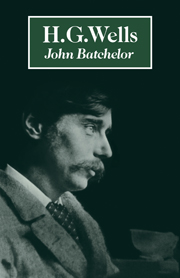Book contents
- Frontmatter
- Contents
- Preface and acknowledgements
- List of abbreviations
- 1 The romances of the 1890s: The Time Machine, The Island of Dr Moreau, The War of the World
- 2 The Edwardian achievement, I: Love and Mr Lewisham, Kipps, The First Men in the Moon, The War in the Air
- 3 The Edwardian achievement, II: Tono-Bungay, Ann Veronica, The History of Mr Polly
- 4 The decade of struggle: Mr Britling Sees it Through, Boon, ‘prig’ novels and discussion novels
- 5 Wells in the modern world: Mr Blettsworthy on Rampole Island, The Bulpington of Blup, The Croquet Player, dualism and education
- Conclusion
- Notes
- Chronology
- Index
4 - The decade of struggle: Mr Britling Sees it Through, Boon, ‘prig’ novels and discussion novels
Published online by Cambridge University Press: 18 December 2009
- Frontmatter
- Contents
- Preface and acknowledgements
- List of abbreviations
- 1 The romances of the 1890s: The Time Machine, The Island of Dr Moreau, The War of the World
- 2 The Edwardian achievement, I: Love and Mr Lewisham, Kipps, The First Men in the Moon, The War in the Air
- 3 The Edwardian achievement, II: Tono-Bungay, Ann Veronica, The History of Mr Polly
- 4 The decade of struggle: Mr Britling Sees it Through, Boon, ‘prig’ novels and discussion novels
- 5 Wells in the modern world: Mr Blettsworthy on Rampole Island, The Bulpington of Blup, The Croquet Player, dualism and education
- Conclusion
- Notes
- Chronology
- Index
Summary
‘Sparring and punching’, 1910–20
In 1910 Wells had a new and unpleasant experience; he was unable to find a publisher for a new novel. The novel was The New Machiavelli; the writing had overlapped with that of Mr Polly and the text was complete by 1910. It was a new kind of novel, a ‘large and outspoken’ book about politics (MacKenzies, p. 268). Macmillan, Heinemann, and Chapman and Hall were all reluctant to take it, partly because of the scandal surrounding Ann Veronica but partly, also, because of the risk of libel; the novel contains clearly identifiable portraits of Arthur Balfour and, especially, Beatrice and Sidney Webb. It was finally accepted by a new publisher, John Lane (through Macmillan's agency) and was serialised in The English Review in 1911.
Since 1900 Wells had been torn between art and his ‘messianic’ view of himself, his quest for a purpose in life to express in his writings. This tension was fruitful in Tono-Bungay, but from The New Machiavalli onwards it damages his work. This novel and the subsequent so-called ‘prig’ novels are marked by absence of humour, hasty composition and a solipsistic conviction that the central figure in each of them is exclusively possessed of truth and righteousness. The novels become moves or gambits in Wells's struggle to shore up his failing prestige; these were the years during which the former admirers of his fiction came to see him as largely a spent force.
- Type
- Chapter
- Information
- H. G. Wells , pp. 94 - 122Publisher: Cambridge University PressPrint publication year: 1985

